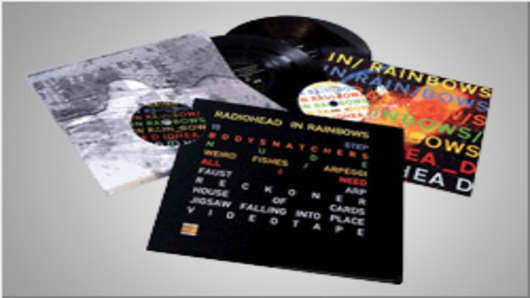With so much attention being paid to the kind of power Apple Inc. wields in the music business--trying to control pricing because of its infinitely popular iTunes online music store--there might be a threat even more serious for the rest of the music industry. And that includes Apple.
Radiohead started all of this when the band decided to forego traditional music distribution, and release its next album "In Rainbows" directly to fans on its website--even let them determine the price they're willing to pay. While that would have been an interesting story all by itself, other dominoes have begun to fall: Now we have word that Oasis, Nine Inch Nails and a handful of lesser-known groups are preparing to do the same thing.
And of course today's blockbuster, $100-million-plus deal with Madonna and LiveNation, hardly a traditional label, as she abandons her longtime relationship with Warner Music .
Nine Inch Nails lead Trent Reznor has made no secret of his disdain for recording labels; all over the wires calling them thieves as well as other nasty names. Many artists feel the same way but are reluctant to say so publicly for risk of losing the label's marketing, production and distribution muscle. In fact, Reznor has actively encouraged NIN fans to pirate online copies of the band's music if they felt the prices were too high to buy the albums.
From the NIN website, Reznor writes: "I have been under recording contracts for 18 years and have watched the business radically mutate from one thing to something inherently very different. It gives me great pleasure to be able to finally have a direct relationship with the audience as I see fit and appropriate."
Blogs are also reporting that one of England's top dance-funk bands, Jamiroquai, may break away from Sony Music after finishing up its eighth album with front man Jay Kaye telling the Sydney Morning Herald that his next album will be released straight to the net.
Artists are trying to regain a measure of control. The idea here is to make an end-run around the labels, the historical gatekeepers, and instead appeal directly to fans. That was something unthinkable just a few short years ago, but thanks to the power of the net and explosive growth in broadband, this kind of strategy is becoming far more realistic. And intriguing. These are merely the first kernels to pop, but the online oil in the industry is heating up and if these guys can make a go of it, and that could make for a lot of online popcorn.
What's at work here? In the same way Apple launched a tectonic shift in the recording industry when it launched iTunes and the iPod, the same technology may be jumping ahead of even that successful paradigm shift. And this might actually end up working in Apple's favor.
Which would be ironic since Radiohead is one of the few mega-success bands that won't go to iTunes. The wall between those two sides indeed could be Radiohead's label. Now that the label is out of the picture, that could open the door to a new relationship. Maybe.
Oasis doesn't have a label deal, and already has a huge fan base, so it can afford to roll the dice and see if this works. Same with the others. The reason this might work for Apple: the company has long had a contentious relationship with the labels.
It seems Apple might strike better accords with the artists themselves, rather than going to a middleman. Or come up with some kind of website link on iTunes that goes direct to an artists site where the music can then be downloaded. Seems to me that a direct partnership with Apple could make a lot of sense. Kind of like the U2 or Madonna deal, only far more ambitious by squeezing the labels out entirely.
If not, these artists, and thousands like them, could beat the labels and Apple at their own games: taking distribution into their own hands as fans let their fingers do the walking.
Questions? Comments? TechCheck@cnbc.com


